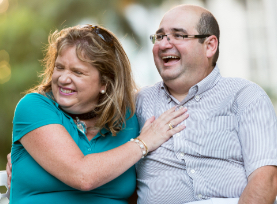There’s a new clinical trial currently recruiting that is exploring an investigational treatment for DbCM that could protect your heart’s health. If you think you may have Diabetic Cardiomyopathy, consider asking about enrolling in the ARISE-HF clinical trial.

Quick background on the Trial:
The ARISE-HF trial is evaluating the effectiveness and safety of an oral investigational drug called AT-001 in adults with Diabetic Cardiomyopathy.
Eligibility Criteria
Diagnosis of Type 2 Diabetes and

60 years
or older
or

40 years or older and
living with diabetes for 10+ years
or

40 years or older and
living with mild to moderate loss of kidney function
Participation is not open to individuals with any of the following conditions:
- HbA1C >8.5
- A prior diagnosis of heart failure (HF)
- A prior heart attack
- A diagnosis of Coronary Artery Disease (CAD)
Other criteria and exclusions may apply
For specific questions related to your eligibility for the ARISE-HF clinical trial please contact:
ARISEHF@appliedtherapeutics.com or call 646-809-8110
About the Trial
ARISE-HF is a clinical trial evaluating the effectiveness and safety of an investigational drug called AT-001 compared to placebo for people with Diabetic Cardiomyopathy (DbCM). This trial will recruit 675 adults and is being conducted at 27 sites across the U.S., as well as sites in other countries.
AT-001 has been developed specifically to target an underlying cause of DbCM. AT-001 is being studied to determine if it can improve the heart’s ability to pump blood, and if it can prevent worsening of the disease. AT-001 is taken orally twice a day.
The U.S. Food and Drug Administration (FDA) has authorized AT-001 for investigational use only, and it has not been approved to treat DbCM or any other disease.
Six Fast Facts About Diabetic Cardiomyopathy
- Approximately 1 out of 5 people with Type 2 Diabetes has Diabetic Cardiomyopathy (DbCM)
- DbCM is a progressive disease that limits the heart’s ability to pump blood adequately.
- The risk of DbCM is higher in people with Diabetes who are older, who have had Diabetes for many years, or who have reduced kidney function.
- DbCM is a serious condition and may progress into debilitating or fatal forms of heart failure.
- While lowering glucose is an important part of managing your diabetes, it may not be enough to prevent complications of diabetes, such as DbCM.
- There are no drugs approved by the FDA to treat DbCM.
Participating Sites
[wpsl template=”default” map_type=”roadmap” auto_locate=”true” start_marker=”dark-green” store_marker=”orange” category_selection=””]
Participants will be randomly assigned to receive either the investigational drug, AT-001 (2 out of 3 people), or placebo (an inactive pill, 1 out of 3 people). All participants will take AT-001 orally twice a day (before breakfast and before dinner).
- The ARISE-HF trial includes a short screening, followed by a study treatment period of approximately 36 months (3 years).
- Screening includes an evaluation of your medical history and a medical examination, including blood and urine tests. Participants who are eligible to proceed will also have an echocardiogram, which is a non-invasive ultrasound of your heart. If the echocardiogram shows that you have Diabetic Cardiomyopathy, your capacity for physical activity will also be tested.
- After the screening period, eligible participants will be randomized and given either AT-001 or placebo capsules to be taken orally twice a day.
- Follow-up visits and examinations will occur approximately every 3 months. The echocardiogram and physical activity test will be repeated one or two more times over approximately 2 years.
Participants will receive a supply of capsules to take at home that will last them until their next scheduled visit.
Medical evaluations, physical exams, and samples of blood and urine will be collected throughout the trial.
What is Diabetic Cardiomyopathy DbCM?
- DbCM is a serious and progressive disease that limits the heart’s ability to function.
- Early on, people find that physical activities are harder to do.
- Later symptoms include shortness of breath at rest, and inability to perform daily activities.
How common is DbCM?
- Up to 1 in 5 people with Diabetes have DbCM.
What are the risk factors for DbCM?
- The risk of DbCM is higher in people who are older or who have had Diabetes for many years.
How is DbCM diagnosed?
- DbCM is diagnosed by a simple non-invasive test called an echocardiogram, which uses ultrasound to show how your heart muscles and valves are working.
Is there a drug I can take now to treat DbCM?
- There are no approved drugs for DbCM.
- The ARISE-HF clinical trial is studying an investigational drug for DbCM.
- AT-001 has been studied in over 100 people with Type 2 Diabetes in earlier trials and will be studied in an additional 675 people in the ARISE-HF clinical trial.
ARISE-HF Clinical Trial
How do I know if a clinical trial such as the ARISE-HF trial is right for me?
- Clinical trials help doctors study potential new medicines to treat a condition - in this case, DbCM.
- There are no drugs for DbCM.
- The ARISE-HF clinical trial will evaluate an investigational drug called AT-001 for
- In an earlier smaller clinical trial in people with Type 2 Diabetes, AT-001 was demonstrated to be safe, well-tolerated, and to reduce certain substances in the body that contribute to heart damage.
Why should I participate in the ARISE-HF clinical trial?
- There are no drugs for DbCM. This clinical trial is being conducted to determine if the trial drug will work to treat DbCM.
Who participates in clinical trials?
- This clinical trial is supported by doctors, nurses, and other healthcare professionals. The commitment of each participant and the entire study team is important to help meet the objectives of the ARISE-HF clinical trial. This trial follows strict ethical and governmental guidelines to ensure that participants’ rights are protected while the information is being collected.
Will I have to stop seeing my regular doctor if I join a clinical trial?
- No, you will keep your regular doctor. The doctor for the trial will monitor your progress throughout the trial and can communicate with your regular doctor as well.
Will I have to change my current medicines for diabetes or other conditions?
- No, you can continue your current medications. AT-001 is being evaluated for DbCM in addition to currently used medications.
Will this be covered by my insurance or will I have to pay out of pocket?
- There will not be any out-of-pocket cost to you, and there will not be any charges to your health insurance to participate in this clinical trial.
How will I take this trial medication?
- This trial involves taking pills twice a day, before breakfast and dinner.
Will there be additional clinic visits if I participate in this trial?
- Yes, there will be additional visits as part of the trial. Trial staff will work with you to coordinate these visits within your schedule and may be able to aid with transportation to the trial site.
Could I receive a placebo (no medicine inside the pill) in this trial?
- Yes, this is a placebo-controlled trial as required by FDA. A placebo-controlled trial helps doctors determine how the trial drug performs compared to placebo.
- In the ARISE-HF trial, 2 out of 3 people will get the active drug and 1 out of 3 people will get a placebo.
- The doctor and trial staff will review information with you regarding the trial, including what to expect and how they will monitor your progress.
What would I have to do if I were to qualify to participate in this clinical trial?
- You will first be provided additional details about the trial, including the potential risks and benefits. You are encouraged to ask questions and make sure you understand what is being explained to you before agreeing to participate.
- To help determine if you qualify, you will then be seen by a health care team that will review your medical history, take blood and urine tests, conduct a physical exam, perform an ultrasound of your heart, and conduct a test to see how your heart performs during exercise.
- The health care team will routinely inquire about your experience during the trial, and conduct routine physical examinations, as well as blood and urine tests. You will also have an additional heart ultrasound and heart function test 1 or 2 more times during the trial.
How long will this trial last and what happens when it is over?
- The trial will last approximately 3 years. Upon completion of the trial, the trial team will coordinate next steps with your primary doctor.
What information should I share with the study doctor before I start the trial?
- The trial team will ask you about your medical history and will also gather information from your medical records to see if you qualify for this trial. This process may take a few days, and the trial team will explain what to expect in terms of timeline and next steps.
What happens if I leave the trial?
- You are free to leave the trial at any point. Leaving the trial will not impact your care.
What will happen to my data?
- Your data will be collected, handled, and processed in compliance with applicable regulation guidelines. It will not be shared with anyone other than in circumstances that will be explained in your consent form.
How can I learn more about participating in the ARISE-HF clinical trial?
- Call: 646-809-8110
- Email: ARISEHF@appliedtherapeutics.com
- Online: ARISEHF.com
- ClinicalTrials.gov Identifier: NCT04083339 or https://bit.ly/3dxjOrC
I’m interested in the ARISE-HF clinical trial and would like to learn more.
All fields marked with an * are required
"*" indicates required fields
